|

Napoleon Bonaparte
La Grand Armee
69,120 infantry
20,160 cavalry
120 artillery |
BATTLE OF LAMBACH
APRIL 28, 1810
Campaign Blog
(Not for current players) |

Archduke Charles
Osterreichische Grossartige Armee
84,000 infantry
10,240 cavalry
96 artillery |
 Following
the French check at Branau, Napoleon ordered his forces to work toward
consolidation and resting. As the Austrians chose this time to begin a
withdrawal toward the Enns river, there were some small engagements of
opportunity by the French. Archduke Charles concentrated his army at Lambach and
ordered his provisional Korps to begin to build breastworks.
Following
the French check at Branau, Napoleon ordered his forces to work toward
consolidation and resting. As the Austrians chose this time to begin a
withdrawal toward the Enns river, there were some small engagements of
opportunity by the French. Archduke Charles concentrated his army at Lambach and
ordered his provisional Korps to begin to build breastworks.
On April 26th, the French began a new offensive aimed at driving
Charles back across the Enns. They were surprised to find that the Austrians had
already abandoned Ried and so pressed on, with Gerard striking at Lambach from
the southwest and Messena to hit it simultaneously from the northwest. Charles
had forseen this threat though and Hiller's II Korps, operating out of
Schaerding, had probed toward Ried, disrupting Massena's march. Ney would be
sent in pursuit of Hiller but the Austrian attack was to delay the march on
Lambach by nearly half a day. Gerard's I Corps though would arrive at Charles'
army on schedule and so would face them alone.
Lefebvre's III Corps would begin to arrive in the early morning
of the 28th, having marched through the night, but it was I Corps under Gerard
that would be facing the bulk of Charles' army. The battle would be of two
halves: In the south, before Vorchdorf, Charles would mass his Liebegarde and I
Korps with the intention of destroying the French I Corps and then moving north
to aid the Provisional Korps.
In the north, around Lambach, the Austrian militia would be dug
in behind breastworks with the hope of slowing any French reinforcements from
Ried enough to give time for the main Austrian army to destroy Gerard.
The French plan was to have Gerard hold Charles long enough that
the main French army could burst through the landwehr and then cross the river
to finish off the Austrians. Ultimately, Napoleon's directive for the battle was
that he was willing to risk everything in an attempt to break this army of
Charles'. Allowing it to retreat in good order to form a new position at Steyr
or Linz was not acceptable.
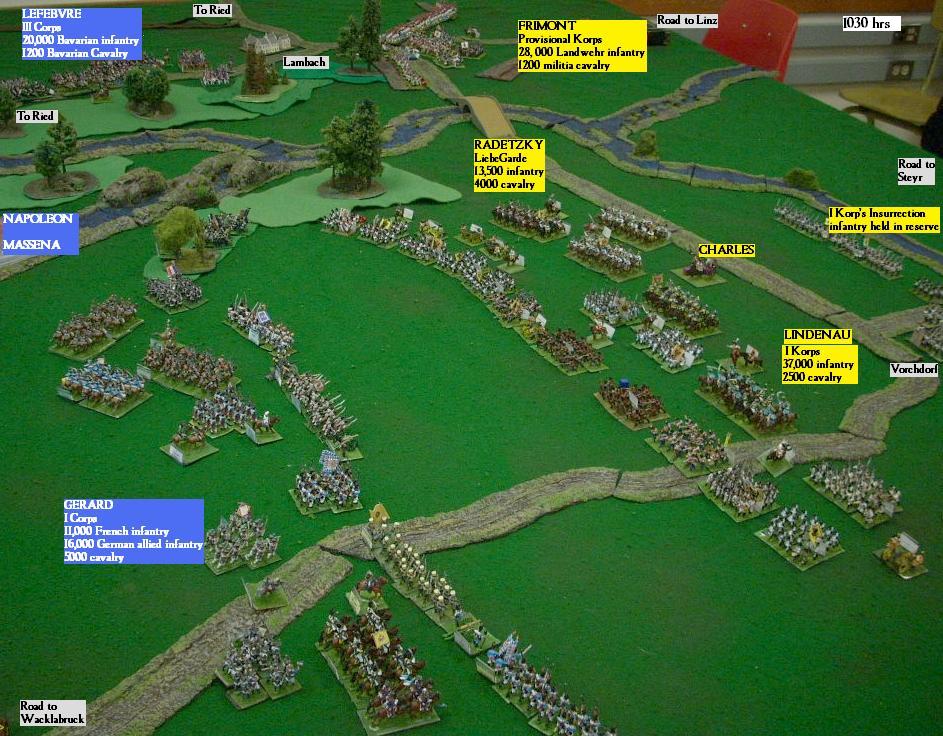
Along with French III Corps' arrival, the lead elements of
French I Cavalry Corps begin to show. The French orders are to break through the
breastwork line, exploit the breech, and then occupy the landwehr with one corps
and send everything else south. The heavy cavalry therefore will not be wasted
trying to frontally assault the breastworks but will instead wait for the
infantry to clear a path for them. The woods to their right would take hours to
pass through so it is ruled out as an option.
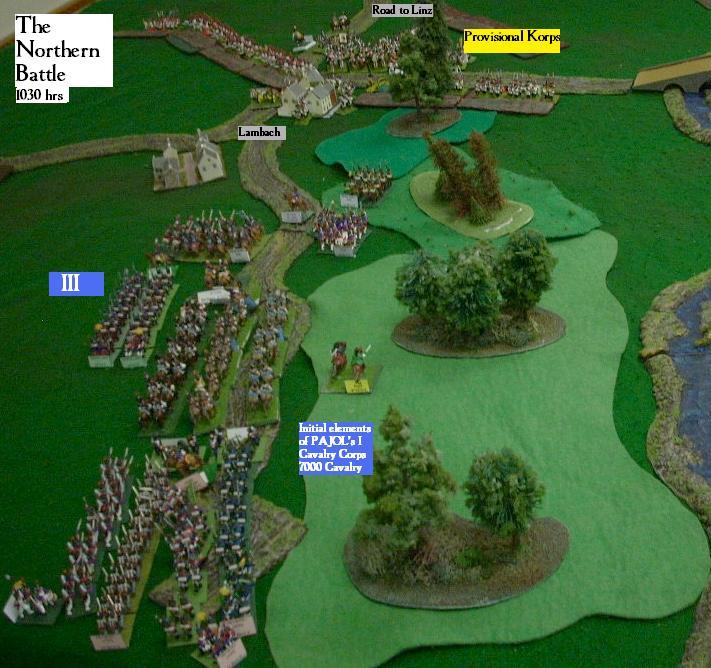
In the south, the Austrians begin aggressively with five
brigades of grenadiers from the Liebegarde driving forward. Two of those
brigades would find themselves rudely repulsed by French light infantry in the
woods while another is disordered by the fire of the voltigeurs and stalled.
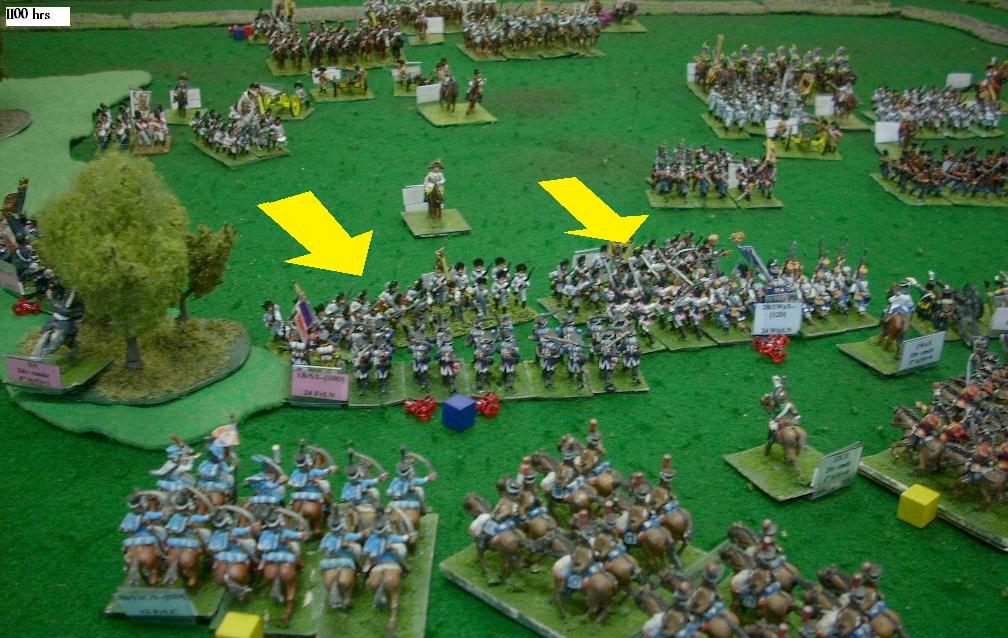
The Austrian grenadiers are terribly unfortunate in their
attacks and take massive casualties before they are entirely driven off.
Lindenau launches a series of attacks on the far left of the Austrian line but
the attacks there would also bog down.
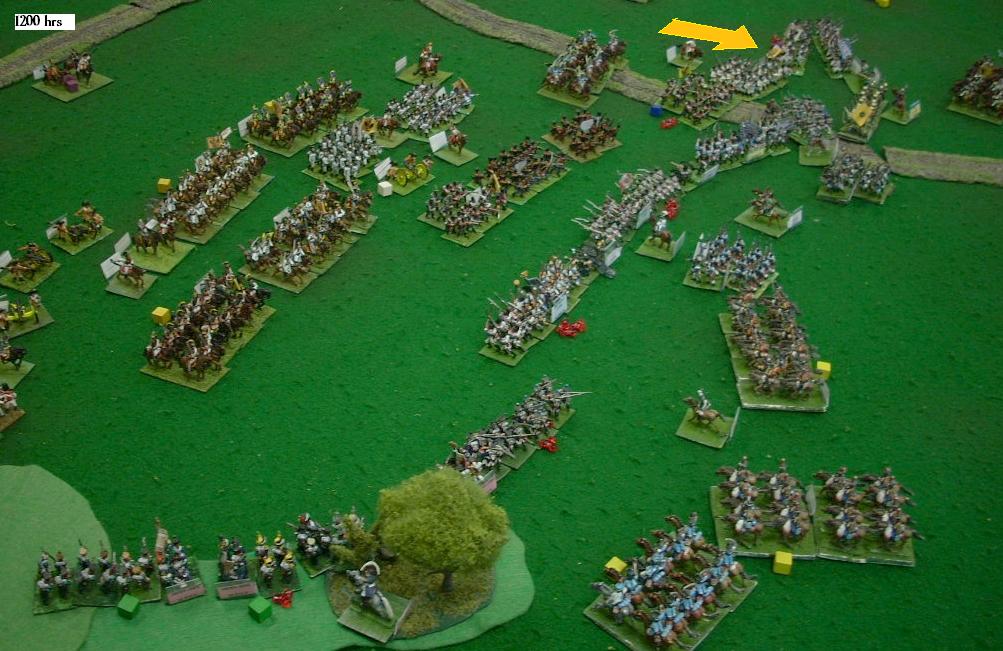
It is Austrian artillery that does what the grenadiers could not
and the French light infantry are hurled from their place in the forest.In the
center of the line, three brigades of Grenzer light infantry are inflicting
terrible casualties upon the French. Lobau's XII Corps arrives from Wacklabruck
and the French line is bolstered when it sorely needed it. An Austrian cavalry
charge would break through to hit one of the arriving march columns but the
effect would be a only minor setback for the French.
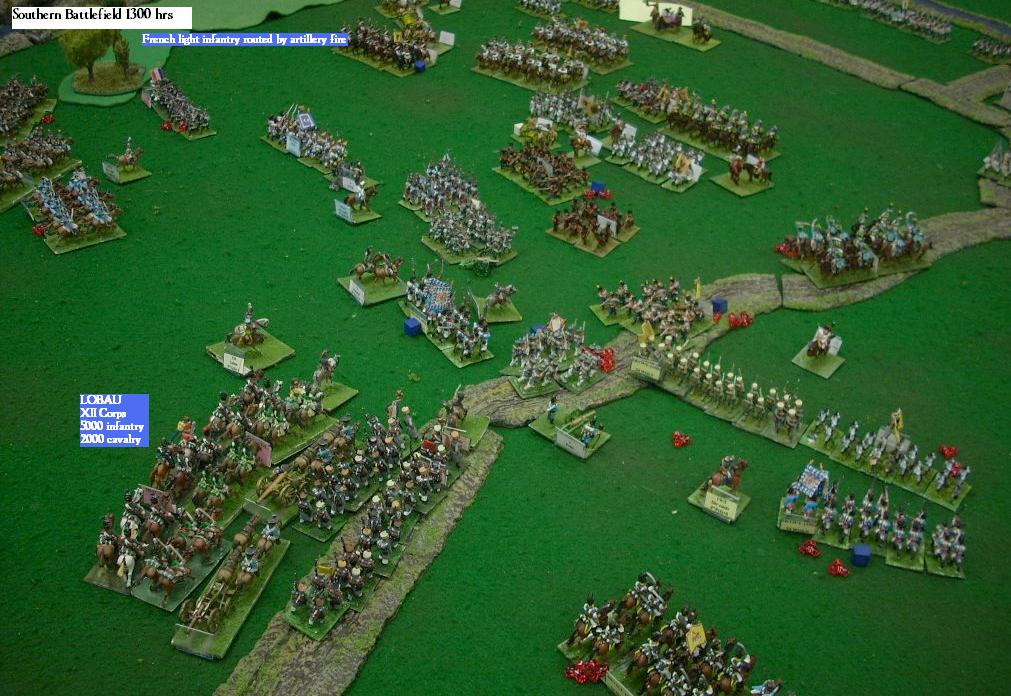
In the north, the task before the Provisional Korps becomes more
daunting. Elements of Ney's IV Corps have arrived following an unsuccessful
skirmish at Linz but more alarming, the Imperial Guard is advancing aggressively
on the hanging Austrian right wing.
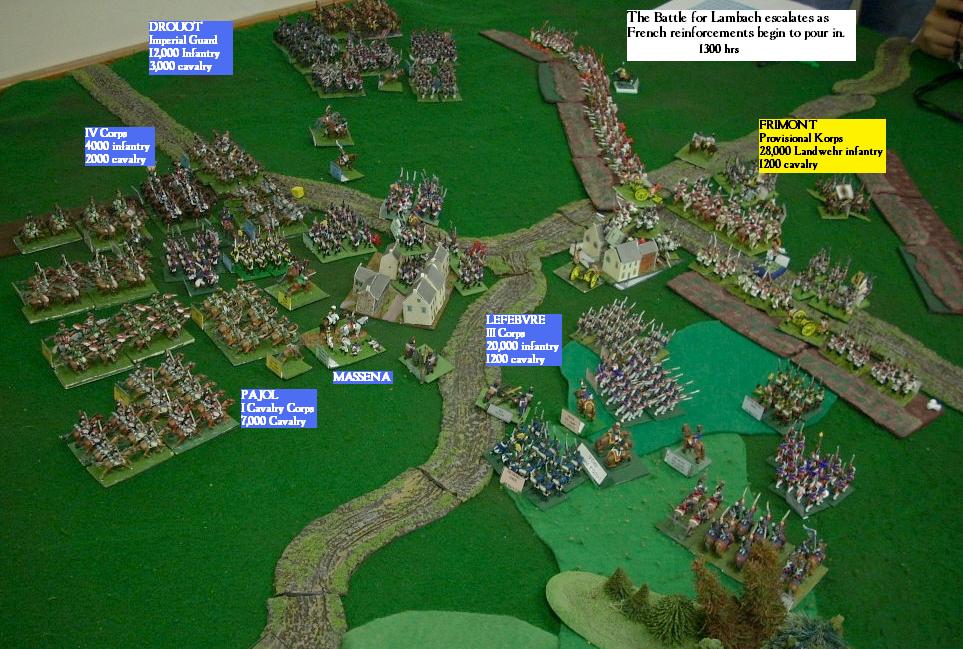
It is early afternoon when the French launch assaults against
the breastworks all along the line. Five thousand Frenchmen charge forward with
bayonets lavelled. Behind the Landwher, General Rohan arrives from Linz with a
small corps.
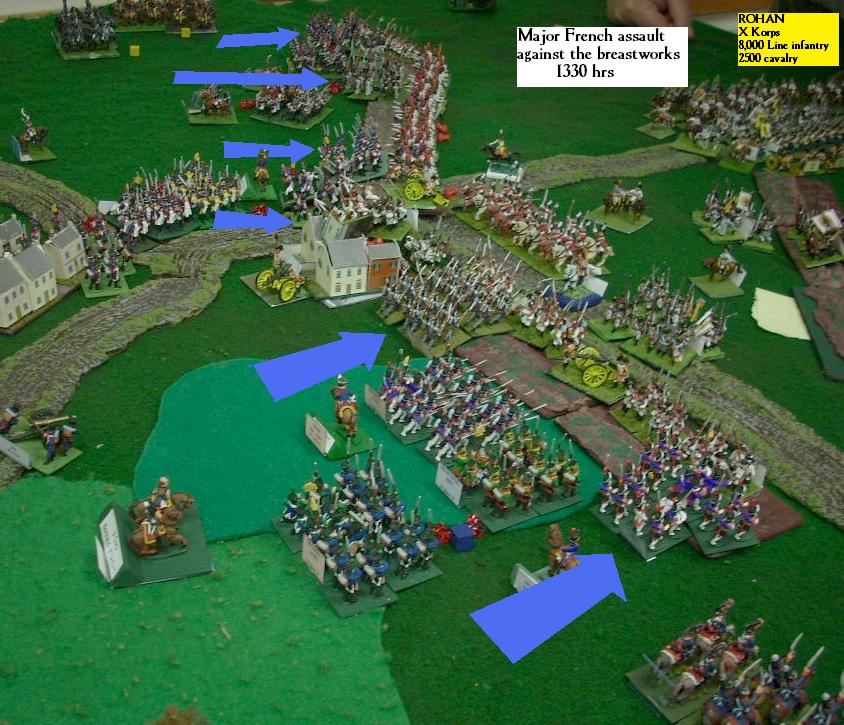
The line holds! Massena is repulsed along the length of the
breastworks. The Guard make some progress but it is at great cost. Austrian
militia are seen with Imperial bearskins held up tauntingly from behind the
apparent safety of their earthworks.
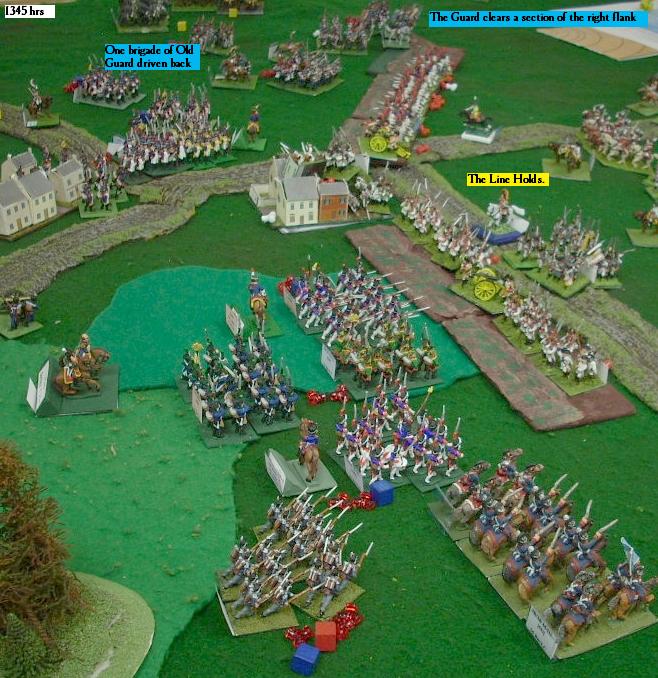
In the south, the fight becomes an even affair of thrust and
parry. The two opposing forces can never seem to get a consolidated attack going
so they throw brigades against one another piecemeal. In one French
counter-attack, General Lindenau would be captured by French Chasseurs.
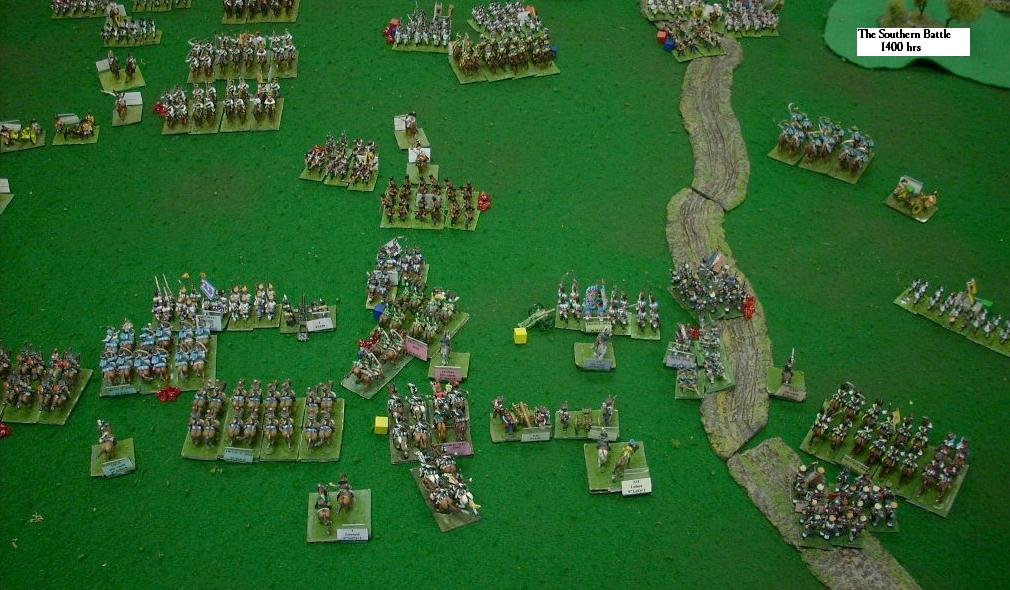
The French are not finished though and more attacks against the
breastwork line begin to allow for breakthroughs. Guns are assembled to try to
level the Austrian held part of Lambach village but the IV corps cavalry decide
that they cannot wait for a gap to appear. They begin to fight their way through
the thick, rough ground of the wood.
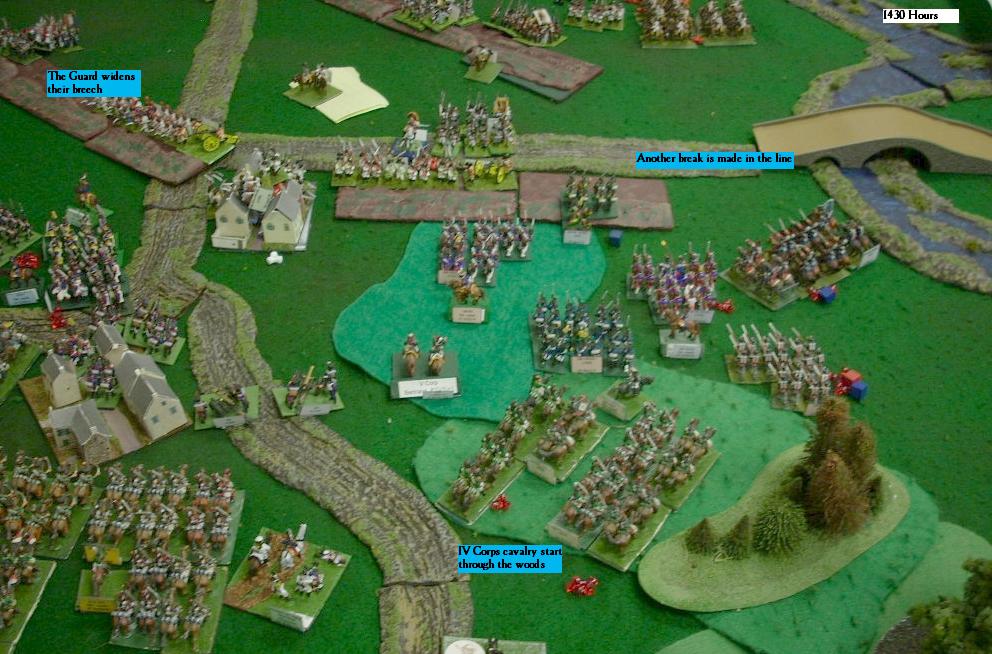
The bulk of the French cavalry, including several thousand
cuirassier, waits though for the fall of Lambach when they can then freely wheel
through it to head south.
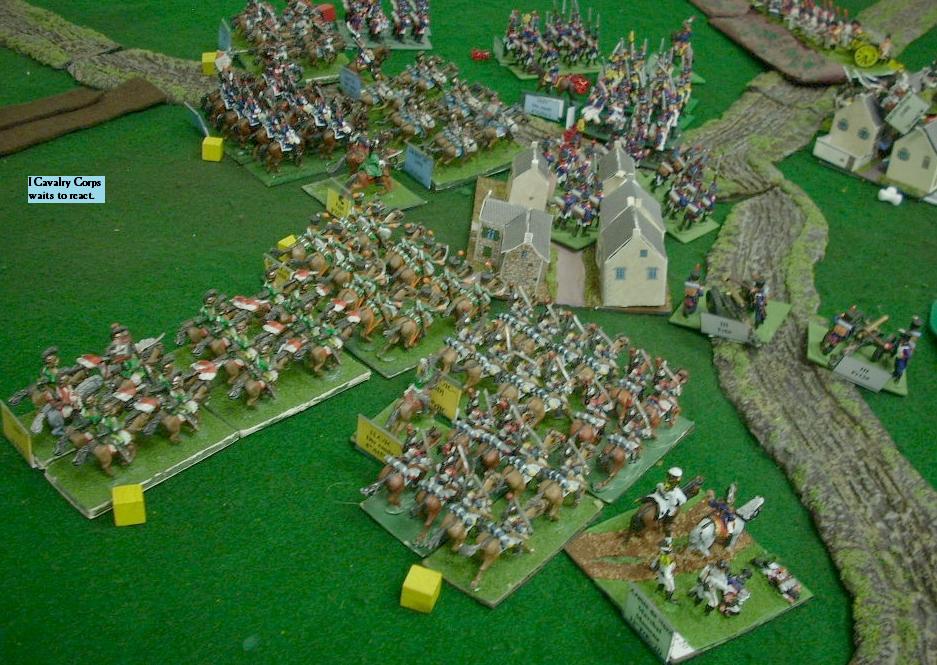
The Austrians have been obliged to cease attacking in the south
and now fall back to try to organize a defense. The French advance where they
can but they are nearly a spent force themselves. Their cavalry, superior in
numbers now, is loathe to bring the weight of the remaining Austrian cuirassier
brigade down upon them so is cautious. One brigade of French cavalry throws
caution to the wind and rides for glory. They would fall short.
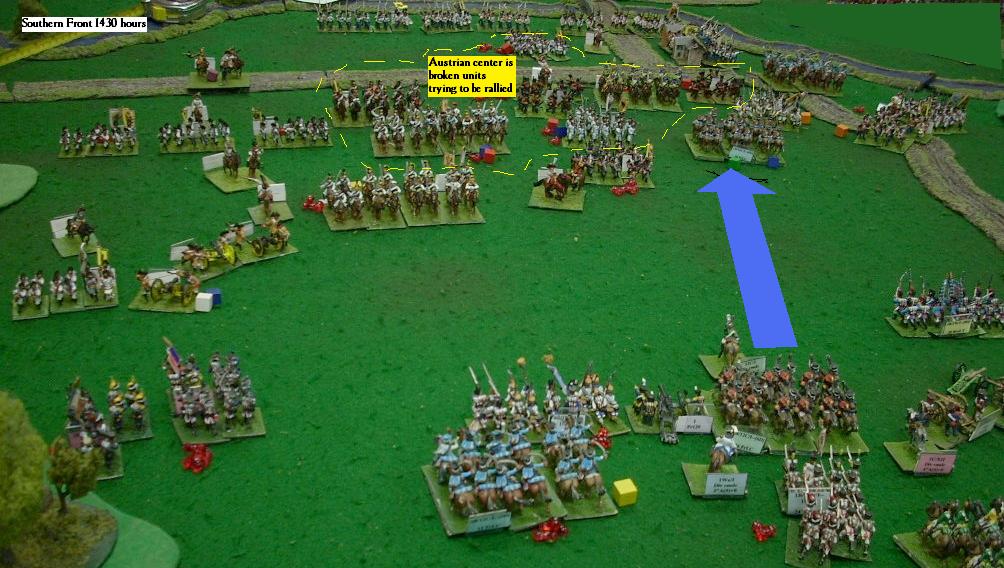
Austrian X Korps would battle the Imperial Guard without fear
and would achieve legendary successes. An Old Guard brigade and a Young Guard
brigade would be routed by fire. While X Corps is mixing it up with the Guard,
the Provisional Korps is finally overwhelmed by French III Corps. The French are
pouring through the breeches at will now and flanking what defences the
Austrians still retain.
The French Cavalry Corps decides that it can no longer wait for
Lambach to fall and hurls itself into the dark wood in the late afternoon.
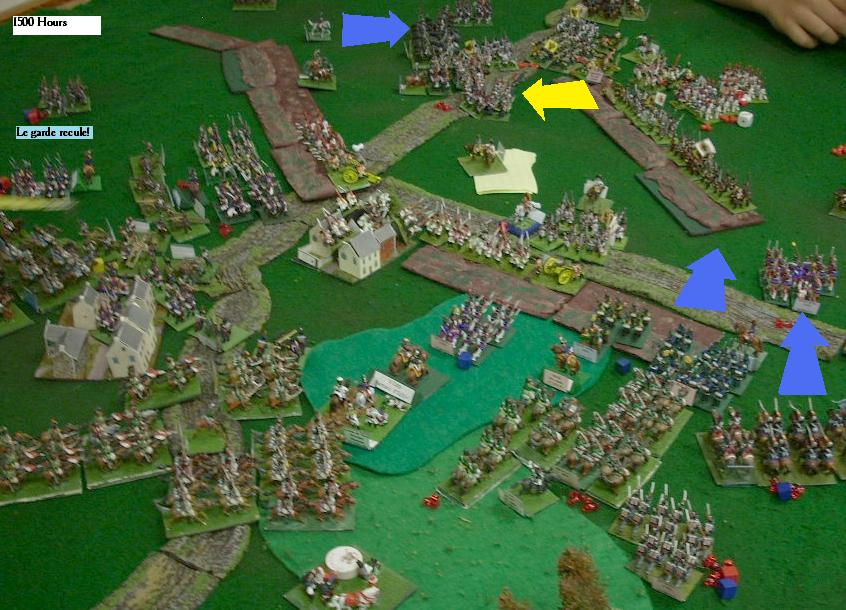
Napoleon moves to personally rally his Old Guard regiments even
while the rest of the Corps continues attacking X Corps. The Austrians are
paying dearly for their successes against the guard and their cavalry is routed
back.
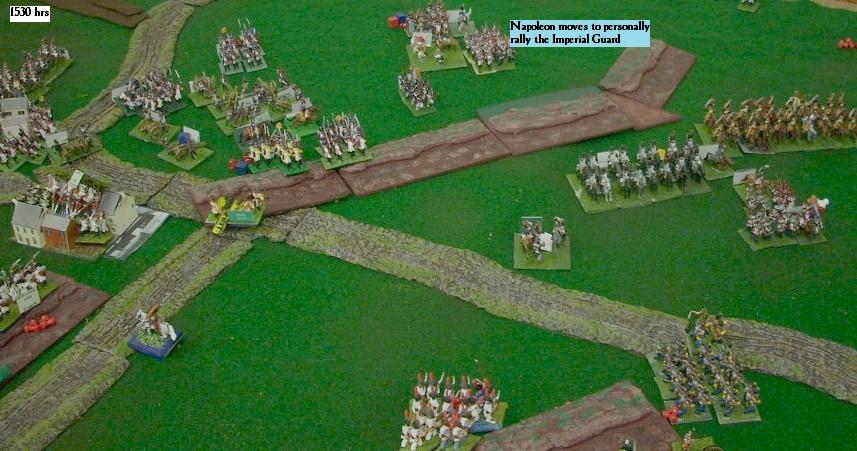
With X Corps rallying in the rear, it is only Landwehr infantry
that the Austrians have to stop the Imperial Guard. Courageously, they go
forward to do just that. The Provisional Korps is elsewhere shattered though and
nothing can be done to prevent the French from driving deep into Austrian rally
areas.
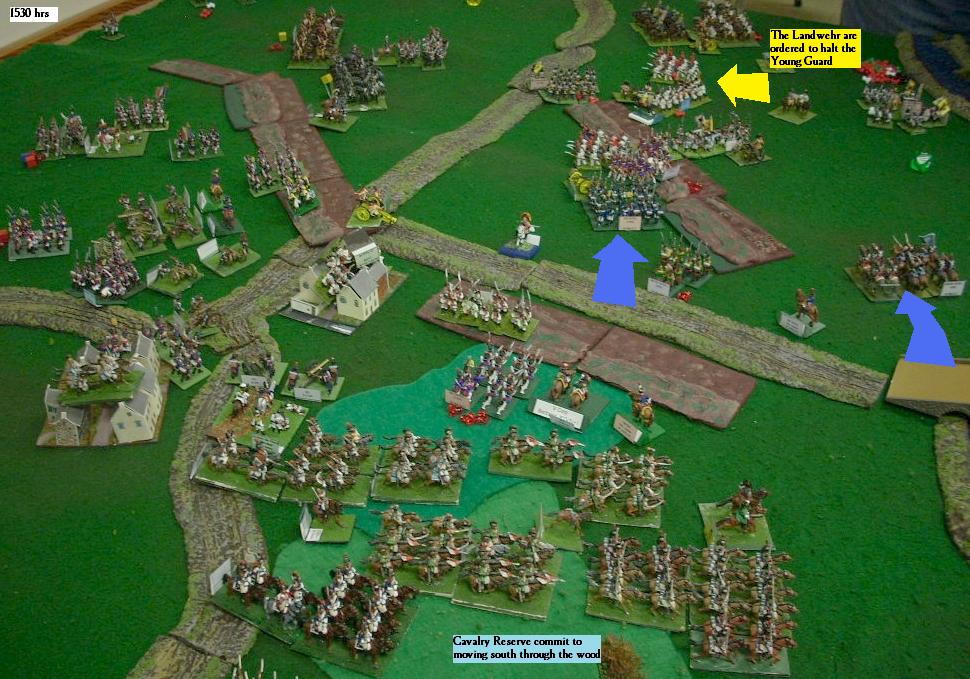
After six hours of fighting, Massena has cleared the last of the
forward line of Austrian breastworks. Lambach village still defies his artillery
though.
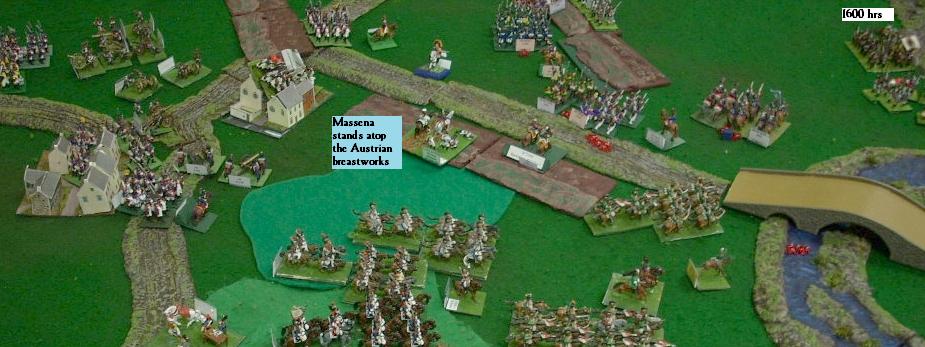
The battle in the south is decidedly in the French favour now.
Gerard and Lobau press forward, knowing that the Austrian I Korps and Liebegarde
are on the verge of breaking. What remains of the Liebegarde grenadiers have
formed themselves into squares to face down the approaching French IV corps
cavalry. Generally, the Austrians are able to fall back to form a new line of
defense better than the French can advance upon it.
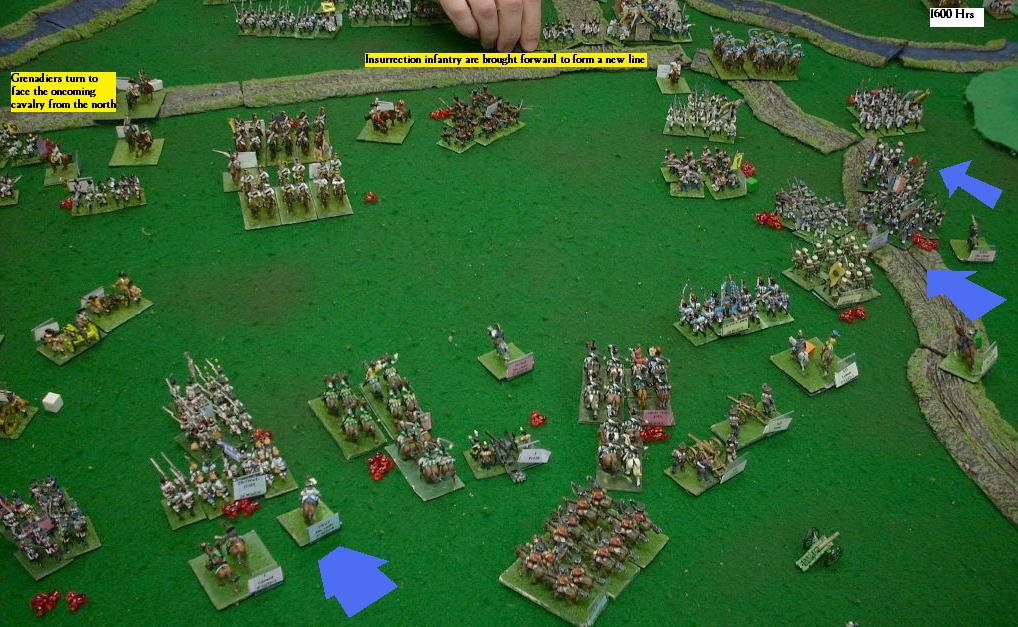
The sky is darkening as Lambach finally falls to the French. The
Austrian Provisional Corps is broken. X Corps tries to hold out and the Imperial
Guard is once more on the attack and that is when a bullet finds the heroic
General Rohan and slays him.
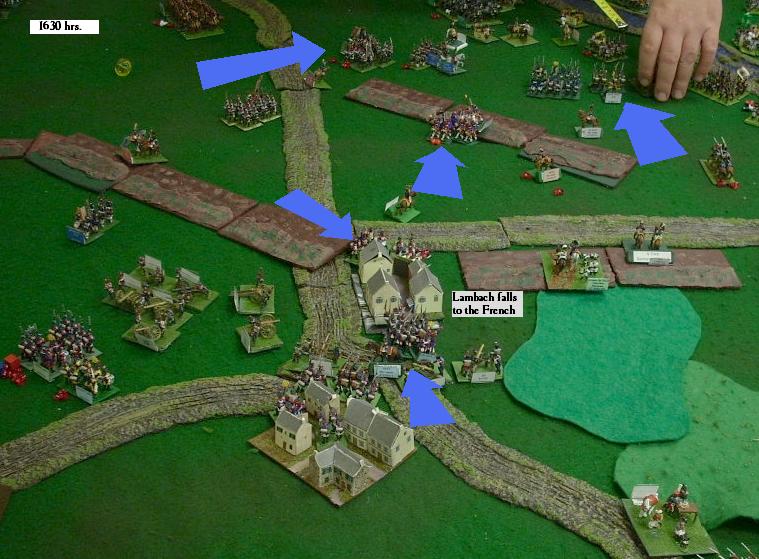
The remnants of Austrian I Korps, the insurrection infantry from
Hungary heroicly holding a line for the regulars to rally behind, stands before
the bridge to Steyr. The French are not done attacking though, despite their
fatigue.
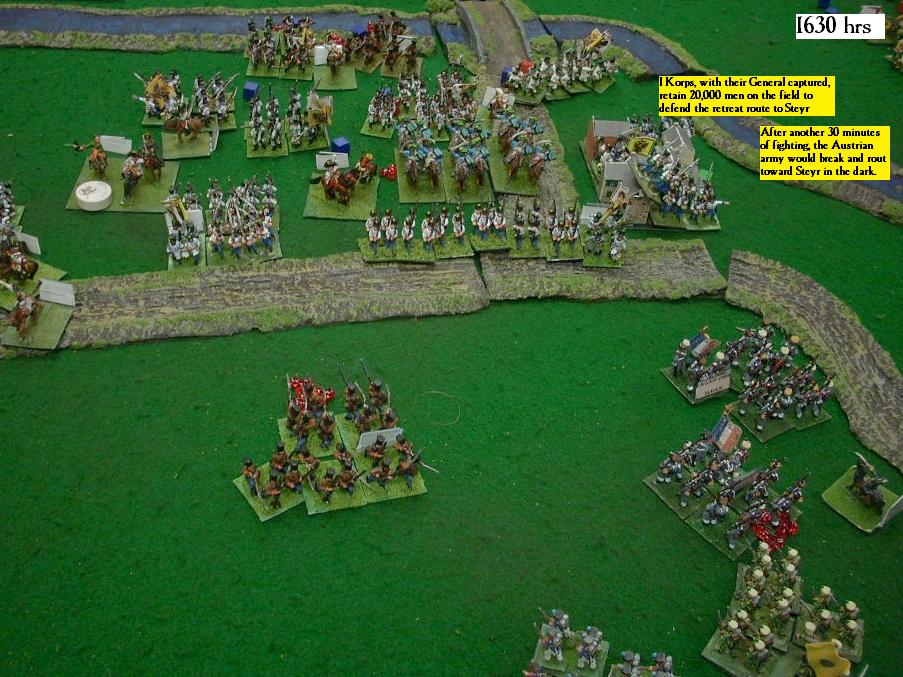
The northern battle would end with X Korps and the Provisional
Korps shattered. The Liebegarde is broken. I Korps too cannot help but follow
the rest of the army routing across the river toward Steyr. It would be a weary
I Corps that would pursue them the next day but that pursuit would be checked by
a fresh VIII Corps waiting at Steyr. It has been summoned to the battle at
Lambach but failed to arrive in time.
Napoleon got the decisive victory that he demanded but the cost
may prove too great. The Old Guard is worn and the Young Guard weakened. I Corps
and III Corps took losses that they could ill afford and the frailty of the
German allies was revealed.
The 1me Cavalry Corps remains fresh.
Austrian losses are estimated at 45,500. French losses at
25,500.





















